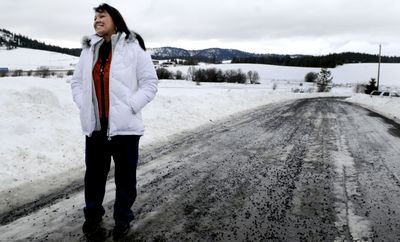Tribe gets OK for radio station
Coeur d’Alene Indian Reservation could receive news, music on station KWIS FM 88.3

PLUMMER, Idaho – In the not-too-distant future, Valerie Fast Horse could wake up to the sound of drumming from a radio station that plays Indian artists.
By tuning in to KWIS FM 88.3, she could also check winter road conditions on the 345,000-acre Coeur d’Alene Indian Reservation. Or listen to a broadcast in Snchitsu’umshtsn, the Coeur d’Alene language. Or catch a recap of the latest tribal council meeting.
Last week, the Federal Communications Commission gave the Coeur d’Alene Tribe approval to start a radio station broadcasting to 8,000 households on the reservation, a thinly populated stretch of fields and forests in Benewah County and southern Kootenai County. The tribe has a three-year window to get the station on the air.
People on the reservation need timely access to news affecting them, said Fast Horse, a tribal councilwoman and the information technology director for the 1,900-member tribe.
“We could turn on the radio and hear what was going on in Spokane and Coeur d’Alene” during the recent winter storms, she said. But the public service announcements didn’t extend to rural plowing schedules or road closures.
Live broadcasts also would be valuable during the huckleberry harvest, which often coincides with the start of wildfire season, Fast Horse said. As families head to the mountains in late summer to pick berries, a traditional food, they need up-to-date information about fire danger and weather, she said.
Last fall, the Coeur d’Alenes were among 37 tribes that applied for FCC licenses to run noncommercial FM stations. The applications, mostly for frequencies in rural areas, came at the urging of Native Public Media.
“We had a full-fledged campaign to get tribal applications,” said Loris Ann Taylor, executive director of Flagstaff, Ariz.-based Native Public Media, which is a spinoff of the National Federation of Community Broadcasters.
Thirty-three of the nation’s 562 federally recognized tribes operate radio stations.
Radio is “a medium that works for Native America,” she said. “It’s a huge, untapped resource.”
Radio is suited to reaching people in sprawling geographic areas, Taylor noted, and it cuts across income levels, reaching families without Internet access, cell phones or wireless devices like BlackBerries.
When Taylor managed a radio station on the Hopi reservation, it produced its own news shows, including specials on coal mining’s legacy on the reservation and meth’s impact on the tribe.
The station “was an extension of the village halls,” she said. “People could get news in real time.”
Taylor also sees radio programming as a medium for strengthening and preserving Native cultures, including language, music and story-telling. Since most of the stations also reach a non-Indian population, there’s an outreach element as well.
“Unfortunately, Native Americans have suffered from stereotypes in the mainstream media,” Taylor said. “This way, ethnic people get to tell their own stories in ways that are accurate and true.”
In her office at the Coeur d’Alene tribal headquarters, Fast Horse listened to a recording of North Carolina artist Jana Mashonee singing “Oh Come All Ye Faithful” in Kalispel Salish.
When KWIS goes on the air, she’d like to see local artists featured, including The Rose Creek Singers and the Pierced Heart Singers, which perform traditional Indian singing and drumming. The station would also air national news of interest to Native Americans, as well as local news and public service announcements.
“Shoot, we could even talk about prices for wheat and Kentucky bluegrass,” Fast Horse said, referring to two of the reservation’s biggest crops. Or, “how about a talk show on the pros and cons of field burning?”
The tribe has applied for a federal grant to hire a radio project manager, who would craft a plan for getting KWIS 88.3 on the air. To reach across the reservation, the signal will be broadcast from a butte in Heyburn State Park.
KWIS means “to be called” in the Snchitsu’umshtsn language.
“It’s like we’re calling all Coeur d’Alenes,” Fast Horse said.